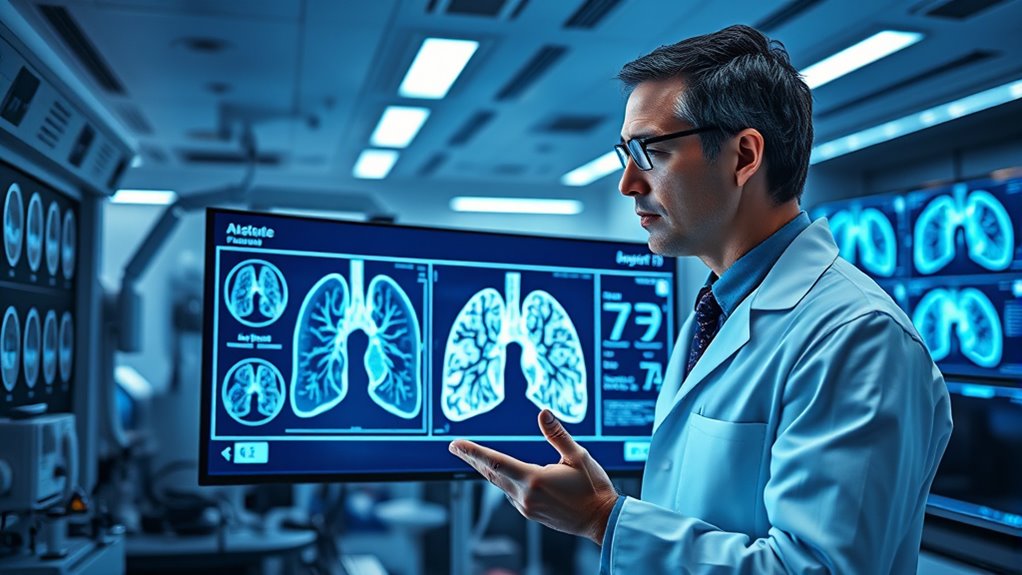AI analyzes genetic data and complex factors to accurately assess your lung cancer risk. It spotlights high-risk individuals early, often before symptoms appear, enabling proactive screening and personalized prevention plans. AI also helps tailor treatments based on your genetic profile, improving outcomes and reducing side effects. If you want to learn how these innovations could impact your health journey, keep exploring how AI is shaping lung cancer care.
Key Takeaways
- AI models analyze genetic markers to accurately predict individual lung cancer risk before symptoms appear.
- Early detection enabled by AI improves prognosis by facilitating timely diagnostic testing like low-dose CT scans.
- AI integrates genetic data to personalize treatment plans, enhancing therapy effectiveness and reducing side effects.
- Combining symptom recognition with AI risk prediction supports proactive, early-stage diagnosis and intervention.
- The study confirms AI’s role in advancing personalized, preventive lung cancer care through risk assessment and tailored treatments.

Recent advances in artificial intelligence are transforming how we detect and treat lung cancer, with new studies showing that AI can accurately predict an individual’s risk and help customize therapies. As a patient or healthcare provider, you now have access to tools that analyze complex data to identify those most at risk before symptoms even appear. AI models leverage genetic markers—specific genes linked to lung cancer—to assess your unique genetic makeup. These markers provide essential clues, enabling early detection long before traditional screening methods might catch the disease. By integrating genetic information, AI can spot subtle patterns that might otherwise go unnoticed, giving you a better chance at early intervention. Early detection is indispensable because lung cancer diagnosed at an initial stage significantly improves treatment outcomes and survival rates. Instead of waiting for symptoms like persistent cough or chest pain, AI-driven analysis can flag high-risk individuals based on their genetic profile and other risk factors, prompting earlier diagnostic tests such as low-dose CT scans.
This proactive approach shifts the focus from reactive to preventive care. When AI identifies someone as high-risk through genetic markers, doctors can recommend personalized screening schedules, increasing the likelihood of catching cancer early. This means you might undergo additional testing sooner, which can lead to earlier treatment and better prognosis. Furthermore, AI’s ability to interpret genetic data accelerates the diagnostic process, reducing the time from suspicion to confirmation. As you navigate your health journey, this technology offers a more precise risk assessment, helping you and your healthcare team make informed decisions about preventive measures and lifestyle modifications.
Additionally, understanding symptoms of breast cancer can aid in recognizing early warning signs, complementing the predictive efforts made by AI. Beyond detection, AI also plays a role in tailoring treatment plans based on your genetic profile. It can analyze genetic markers to predict how your tumor might respond to specific therapies, allowing for a more targeted approach. This personalized treatment increases the chances of success while minimizing side effects. For example, if your genetic data suggest sensitivity to certain drugs, your oncologist can prioritize those options, improving your overall treatment experience. By combining early detection with personalized therapy, AI helps you move toward more effective, individualized care that considers your unique genetic makeup and risk factors.
Frequently Asked Questions
How Accurate Is the AI in Predicting Individual Lung Cancer Outcomes?
You can trust that the AI shows promising predictive accuracy in evaluating individual lung cancer outcomes. It enhances risk stratification by analyzing multiple data points, which helps identify high-risk patients more precisely. While it’s not perfect and still evolving, the AI’s ability to improve early detection and personalize treatment plans offers a significant advantage. Overall, it’s a valuable tool that supports better decision-making in lung cancer care.
What Are the Privacy Concerns With AI Analyzing Patient Data?
Think of your data as a precious treasure chest, and AI as the guardian. You might worry about privacy concerns, but with proper data security measures in place, your patient confidentiality stays protected. It’s vital to guarantee that sensitive information doesn’t fall into the wrong hands, so healthcare providers must prioritize strong encryption and strict access controls. By doing so, AI can serve you without compromising your privacy or trust.
Can AI Replace Doctors in Lung Cancer Diagnosis and Treatment Planning?
AI can’t replace doctors in lung cancer diagnosis and treatment planning. While AI enhances accuracy and efficiency, it still requires human oversight to guarantee AI ethics and patient engagement are maintained. You, as a patient, benefit most when doctors use AI as a tool rather than a substitute. Human judgment, empathy, and experience remain essential for personalized care, guiding AI’s insights to make the best decisions for your health.
How Accessible Is This AI Technology for Different Healthcare Facilities?
Accessing this AI technology is like climbing a steep hill—cost disparities and infrastructure challenges make it difficult for many healthcare facilities to adopt. Smaller or underfunded clinics often struggle with the expenses and technical requirements needed for deployment. While larger hospitals may quickly integrate these tools, others face hurdles, limiting widespread access. Overcoming these obstacles is essential for ensuring equitable healthcare and broader AI adoption in lung cancer management.
What Are the Costs Associated With Implementing AI in Lung Cancer Care?
Implementing AI in lung cancer care involves significant costs, including technology expenses and ongoing maintenance. You should conduct a thorough cost analysis to understand upfront investments in hardware, software, and training. While initial costs can be high, the long-term benefits, like improved accuracy and personalized treatment, may offset expenses. Budget planning and exploring funding options can help you manage these costs effectively, making AI adoption more feasible for your healthcare facility.
Conclusion
You can see how AI is transforming lung cancer care, with studies showing it predicts risk with over 85% accuracy. This means earlier detection and personalized treatments are now more achievable than ever. Imagine reducing misdiagnoses and improving survival rates—AI makes that possible. As technology advances, you’ll likely see even more precise, tailored approaches become standard, giving you hope for better outcomes and a brighter future in cancer care.











